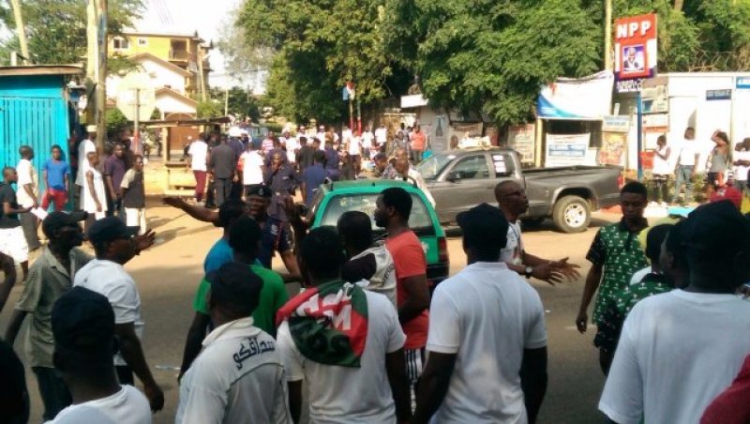High unemployment and breakdown in family ties are causes of election violence in the Bono and Ahafo Regions, a study has revealed.
The survey also identified weak or inadequate electoral management body structures, including weak democratic institutions, dysfunctional judicial systems and polarized security agencies as major threats to the nation’s multi-party democracy, freedom of speech and rule of law.
The study recommended the need for successive governments to address these critical national challenges to foster unity and social cohesion in the nation’s political space.
It was conducted by Global Media Foundation (GLOMeF), Tim Africa Aid Ghana, and West Africa AIDS Foundation, all NGOs as part of a-15 month Election 2020 project being implemented by the NGOs with support from Star Ghana Foundation.
The project aimed at discouraging and reducing election-related violence in the constituencies through community dialogue and conflict resolution.
It is also to increase women, young people as well as People with Disabilities (PWDs) participation in politics and governance.
It further aimed at increasing the capacities of the electorate and election stakeholders, mostly in hard to reach communities, to influence political party manifesto to promote issue-based electioneering.
Titled “managing election 2020 related violence for democratic stability in Ghana”, the study was conducted in the Asunafo North and Asunafo South constituencies of the Ahafo and Banda and Tain constituencies of the Bono Region.
Police in the two regions have identified these areas as volatile and major election hotspots constituencies with a long history of political violence that threaten national peace and stability.
Societal challenges such as inequality and poverty, ethnicity and gender inequality remained electoral challenges of greater concern, Mr Raphael Godlove Ahenu, the Chief Executive Officer of the GLOMeF who released the outcome of the study indicated.
Speaking at a day’s election reporting training workshop for journalists, held in Sunyani, Mr Ahenu explained the concept of the study was drawn from data collected from Ghana’s 2012 Round five Afro barometers and the pre-election survey conducted by the Center for Democratic Governance (CDD-Ghana).
The three NGOs, implementing the Star Ghana Foundation project, organised the training workshop, which was attended by about 30 selected Journalists from the project implementing regions.
Other electoral challenges the survey mentioned included selfish leadership and weakened civil society activities, Mr Ahenu indicated saying until these challenges were addressed, it would be difficult for the nation to control political and election violence in the country.
Latest Stories
-
CHAN 2024Q: Ghana’s Black Galaxies held by Nigeria in first-leg tie
34 minutes -
Dr Nduom hopeful defunct GN bank will be restored under Mahama administration
1 hour -
Bridget Bonnie celebrates NDC Victory, champions hope for women and youth
1 hour -
Shamima Muslim urges youth to lead Ghana’s renewal at 18Plus4NDC anniversary
2 hours -
Akufo-Addo condemns post-election violence, blames NDC
2 hours -
DAMC, Free Food Company, to distribute 10,000 packs of food to street kids
4 hours -
Kwame Boafo Akuffo: Court ruling on re-collation flawed
4 hours -
Samuel Yaw Adusei: The strategist behind NDC’s electoral security in Ashanti region
4 hours -
I’m confident posterity will judge my performance well – Akufo-Addo
4 hours -
Syria’s minorities seek security as country charts new future
5 hours -
Prof. Nana Aba Appiah Amfo re-appointed as Vice-Chancellor of the University of Ghana
5 hours -
German police probe market attack security and warnings
5 hours -
Grief and anger in Magdeburg after Christmas market attack
5 hours -
Baltasar Coin becomes first Ghanaian meme coin to hit DEX Screener at $100K market cap
6 hours -
EC blames re-collation of disputed results on widespread lawlessness by party supporters
6 hours

